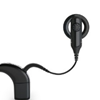Cochlear Implants
 A cochlear implant is a small, surgically implanted, complex electronic device that can help to provide a sense of sound to a person who is profoundly deaf or severely hard-of-hearing. A cochlear implant directly stimulates the auditory nerve. Signals generated by the implant are sent by way of the auditory nerve to the brain, which recognizes the signals as sound.
A cochlear implant is a small, surgically implanted, complex electronic device that can help to provide a sense of sound to a person who is profoundly deaf or severely hard-of-hearing. A cochlear implant directly stimulates the auditory nerve. Signals generated by the implant are sent by way of the auditory nerve to the brain, which recognizes the signals as sound.
National Association Resources

- ASHA: Cochlear Implants
- ASHA: Cochlear Implants Handout
- AG Bell: Cochlear Implants
- Hands and Voices Handout: Cochlear Implants
- National Institute on Deafness
General Information about Cochlear Implants
- Videos about Cochlear Implants
- Cochlear Implant Brands
- PEPnet Cochlear Implant Fast Facts
- Parent/Teacher Friendly Handout
- Funding Opportunities
Professional Development and Training
Cochlear Implants in School
